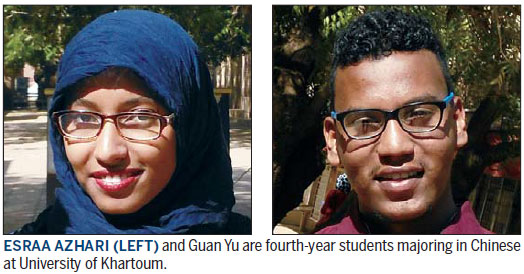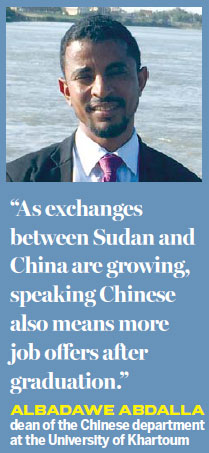Sudan's sudden rush for Chinese

Mandarin is so popular that students at the University of Khartoum are sitting two to a desk
Even before going through the gate into the Chinese department of University of Khartoum in Sudan, the synchronized sounds of students reading Chinese reached my ears.
After stepping into the small compound, separated from a noisy street only by a low, yellow wall, my eyes were greeted by Sudanese youths standing in a small circle and enthusiastically reading from the 1953 novel Long Live the Youth by Wang Meng.
| Students perform a Chinese dance at the Chinese department of the University of Khartoum on March 1. Photos by Rong Changhai / For China Daily |

"That is the way they are reaching out to Chinese language and culture. They love reciting poetry because they find it charming and rhythmic. We also have similar elective courses in calligraphy, Chinese music and dancing," says Zhou Ping, a Chinese teacher from Wuhan University of Technology.
Zhou is one of seven teachers from China who have seen how learning Chinese has become a trend in the African country.
"As more students choose Mandarin or shift their major from other languages to Chinese, there are not enough classrooms and chairs, and in a crowded classroom two students sometimes have to share one chair," she says.
"Chinese teachers like me are the first ones to be touched by these young and ambitious souls, to see them so passionate about your language, music or dancing," she adds.
Among the students reciting poetry is Esraa Azhari, a fourth-year student, who after enrolling at the University of Khartoum, one of top universities in Africa, changed her major from English to Chinese and then fell in love with the style of dancing from the Xinjiang Uygur autonomous region in Northwest China.
"I learn dancing from my teacher as well as from videos downloaded from Chinese websites such as Youku," says Azhari, who danced to Chinese music immediately after finishing her poem rehearsal.
"At the beginning, I thought about giving up because Chinese is really difficult, but now it would kill me if I had no chance to learn Chinese," she says.

Another fourth-year Sudanese student, who insisted on using his well-chosen Chinese name, Guan Yu - the name of a respected general in the famous Chinese novel Romance of the Three Kingdoms - says he picked up Mandarin because he was so envious of his brother being able to speak good Chinese.
"I love my Chinese name because it represents power and justice, something I cherish deep in my heart," says 21-year-old Guan.
When asked about whether he wants to learn Chinese kung fu in China, he answered as quickly as if he were executing an attack in the ancient martial art. "Definitely I will learn Chinese martial arts in China because General Guan Yu was a kung fu master," he says, with a sparkle in his eyes.
Albadawe Abdalla, dean of the Chinese Department at the University of Khartoum, says the increased study of Chinese is a welcome trend in his country. Yet it also poses what the professor calls a happy problem. So many Sudanese want to major in Chinese that Albadawe has had to turn away at least half of the applicants after rounds of interviews.
"It makes me sad to not let them in the door, but a shortage of Chinese teachers, books and classrooms won't allow me to always make a generous decision," says Albadawe, whose department now has nearly 300 students.
There are more than 3,000 books on Shakespeare in the library of the faculty of arts, but few Chinese books can be found there, says the 34-year-old dean, whose Chinese is so good he knows how to employ Chinese humor during his conversation with native speakers of the language.
Albadawe has been working hard to build a Chinese language library at the university. The Confucius Institute at the University of Khartoum has promised more than 3,000 Chinese books, he says.
"As far as I know, the Confucius Institute at our university and its headquarters in Beijing are considering a new building for the department to meet the ballooning demand for Chinese learning," he says.
"However, a lack of facilities has kept students from being able to flow freely into our department, which they would do because they really love Chinese and the culture. And, as exchanges between Sudan and China are growing, speaking Chinese also means more job offers after graduation," says Albadawe, who worked as a translator for a Chinese company in Sudan before joining the faculty of arts of the University of Khartoum in 2012.
If you ask the Sudanese students what they are going to do after graduation, you will find most of them want to become a translator, says Zhou of Wuhan University of Technology.
"Such a job preference represents a mindset that means that they want to keep doing something closely related to China or Chinese culture," she says.
To them, Mandarin is a bridge between dreams and reality, the known and unknown, while being a translator also means being a bridge for understanding and sharing, she says.
suqiang@chinadaily.com.cn
(China Daily Africa Weekly 04/01/2016 page18)
Today's Top News
- Technological innovation brings China's cultural heritage alive
- Consumption to play bigger part in growth
- Opposition moves to impeach Lai
- Ties with Beijing underscored in Putin remarks
- Character, phrase of year underscore tech aspirations
- Macao thrives as collaboration deepens































